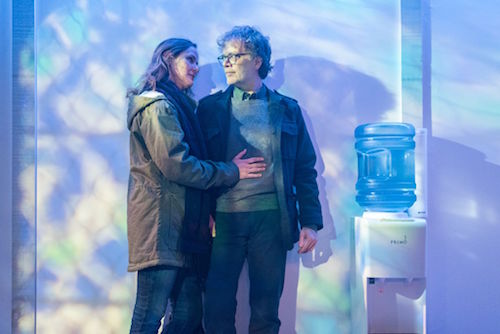 Poison explores the human relationship with loss, playing at the Coal Mine Theatre in Toronto
Poison explores the human relationship with loss, playing at the Coal Mine Theatre in Toronto
The Canadian premiere of the award-winning Poison by Dutch playwright Lot Vekemans, Coal Mine Theatre’s first commissioned translation, features a gaping hole at its core by design. Despite (or perhaps because of) this, it’s one of the most fulfilling plays I’ve seen this year.
A formerly-married couple meets for the first time in ten (or nine, depending on who you ask) years, after the tragic death of their son. The subsequent dissolution of their identities and marriage is capped off by his abandonment of her on the eve of the new millennium.
They’ve been asked to come to discuss moving their son’s grave due to poison in the nearby earth. But, of course, the title doesn’t just refer to that poison, but the poisonous effect of grief and loss, and the desire to have things back as they were. In this play, loss is palpable, whether it’s the absence of a missing person, or the pain of a curdled relationship, even if the people involved remain.
If the setup suggests melodrama and cliché, the execution is anything but. In part, Poison is a rebuke both to the nature of performative grief and the societal devaluing of women’s emotions, represented in the couple’s competing grief narratives. (This is backed up by the characters’ lack of names; they are only called He and She.) Her grief leaves her lonely and broken; his nets him a new family and the chance to create “world literature” out of his experience.
Linked with this male privilege is the initial seduction of identifying with the man who has (supposedly) been able to let go, move on from his grief, and become less inconvenient to the society around him. It’s a reminder of how easily we grow weary of grief that isn’t ours, and how we tend to react poorly when people don’t “get better” on a quick enough timeline.
But it would be reductive to boil Poison down to this message; if that’s all it were about, it wouldn’t get under your skin in the way it does. It’s not about huge revelations (you’ll see any of those coming, and the play doesn’t depend on them one bit). Instead, measured and unusual in its trajectory, and resonant in its complex range of emotions, it grows and blossoms. Though in some ways She remains more of a cipher than He, both become fully-developed and painfully human characters who earn your sympathies.
Ted Dykstra and Fiona Highet are honestly wonderful in roles that demand a lot of nuance; the parts feel lived in. They create two damaged individuals, neither of them monsters or saints, just made hopelessly incomprehensible to and incompatible with each other by grief. They share trauma and heavy subject matter, but also moments of surprising warmth and light within the emptiness.
That emptiness is also in the sparseness of the simple stark white set (time passes with light and shadow) and in the rhythm of Rina Vergano’s translated dialogue, particularly in the early third of the tight 75 minutes. There are a few references to setting (she lives in Holland, he’s moved to France) but they’re relevant only to maintain that feeling of distance between the characters: this is universal. It’s easy to feel this distance when there’s barely any physical distance between actors and audience; the incredibly intimate space of the small Coal Mine Theatre felt perfect for this purpose.
One of the quirks of world language is that the word for “poison” in Dutch and German is “gif,” or “gift.” That’s what this production feels like: a poison that’s also a gift. It’s odd to be charmed by a play about endless pain, but here it is – I was. I think you should see Poison. Maybe it’ll fill a missing spot you never knew you had.
Details:
- Poison plays at Coal Mine Theatre (1454 Danforth Avenue) until December 3, 2017.
- Shows run Tuesday-Saturday at 7:30PM, with Sunday matinees at 2PM.
- No latecomers are admitted.
- Tickets are $42.50 plus HST and can be purchased online.
- Audience Advisory: This production uses a haze machine
Photo of Fiona Highet and Ted Dykstra by Dahlia Katz
